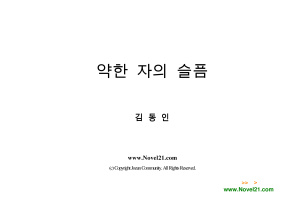Copyright Joeun Community. — 94 p. (in Korean)
Kim Dong-in is best known for his short stories that combine
exquisite aesthetic sensibilities with succinct prose style and
objective perspective. He first drew attention with the publication
of such naturalist stories as “Distinguished Statement” (Myeongmun,
1924), “Hwang the Rustic” (Sigol Hwangseobang, 1925) and “Potato”
(Gamja, 1921). In particular, “Potato,”a story of a woman who
gradually loses all sense of decency and degenerates into a common
prostitute as she tries to overcome economic hardships, is noted
for the author’s use of realism and deterministic viewpoint to defy
traditional morality and the didactic use of literature advocated
by Yi Kwang-su’s enlightenment movement. In an era dominated by
Proletarian Movement and New Tendency School of Thought, when art
was utilized to further ideological debates and social changes, Kim
Dong-in upheld the vision of pure aestheticism and the autonomy of
literature as art. This view is reflected in his aestheticist
fiction such as “Sonata Appassionato” (Gwangyeom sonata, 1930) and
“Gwanghwasa Temple” (Gwanghwasa, 1930) which feature mad artists in
pursuit of artistic perfection.
〈약한 자의 슬픔〉은 1919년 《개벽》 창간호에 발표된 단편 소설이다. 김동인의 처녀작으로 신경쇠약의 여주인공
엘리자베스의 비극을 그렸다. 성격 창조와 심리 묘사에 주력한 작품으로 한국 최초의 본격적인 작품이라는 데 문학사적인
의의가 있다.
김동인. 약한 자의 슬픔 / Ким Дон Ин. Печаль слабого человека
- формат pdf
- размер 380,79 КБ
- добавлен 09 января 2017 г.

